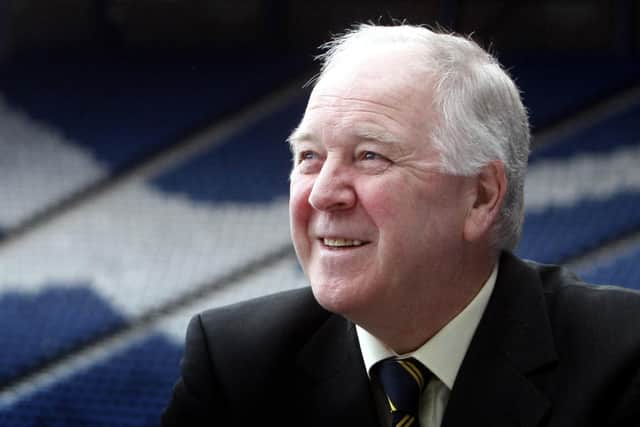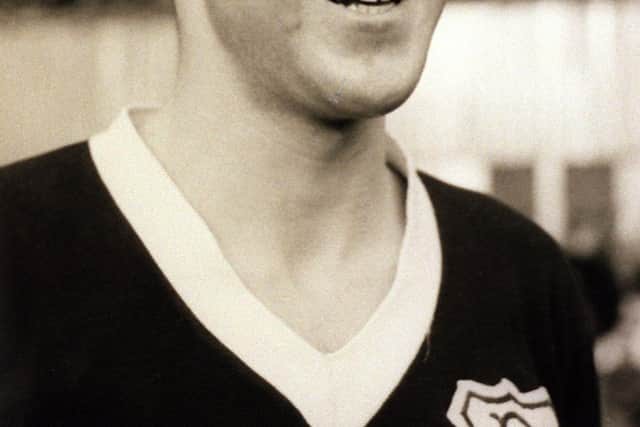Craig Brown: How Scotland great earned Dundee title medal and 'bleeper' nickname in shortest of playing careers
It was interesting to note that, in the reams written about his life and times last week following his death at the age of 82, there was a repeated inconsistency. It concerned one not insignificant part of his career.
Brown's period as manager of Scotland was variously described as spanning either 70 or 71 games. The discrepancy hinges on whether the first time Brown took charge of the national team, for a World Cup qualifying defeat against Italy in October 1993, should count towards his official record.
Advertisement
Hide AdAdvertisement
Hide AdHe was, after all, only an interim manager at the time. He was not confirmed as Andy Roxburgh's permanent successor until the following month.


Understandably, Brown preferred to view it as 70 matches, meaning a defeat could be struck from his ledger. Only nine competitive losses as Scotland manager between 1993 and 2001 really is remarkable.
Whether it is 70 or 71 matches, the figure is still more than twice the number of competitive appearance he amassed as a player during his injury-dogged career. It does seem very unfair although Brown, in another mark of the man, always stressed how grateful he is to have played at all.
He knows that plenty of better players did not experience what he did. And he might have been one of those better players had he not experienced a ruinous knee injury in his late teens.
As it was, he was good enough – despite everything. Brown played just 32 top-level games in total and still managed to win a Scottish title medal.


Much was made of his managerial prowess in the tributes that appeared in newspapers and online as well as on radio and television in the days following his death on Monday. His playing career might have been limited in terms of game-time but it was still a decade of his life, spent, for the most part, at the very top level, with Rangers, initially, and then Dundee.
He then moved to Falkirk, where he played alongside old Rangers teammate Jim Baxter, and finally Stranraer, where he called it a day after just one friendly v Larne. Honourable as ever, Brown returned what the club had already paid him.
As he writes in The Game of My Life, his autobiography originally published in 2001, the switch from Rangers to Dundee did not on the face of it appear to represent an upward career curve. “I had started that season as a reserve for a club that had finished as champions of Scotland, and now I had become a reserve with a club that had finished below the halfway line in the table,” he notes. Dundee were 10th in 1960-61, below even arch-rivals Dundee United for the first time.
Advertisement
Hide AdAdvertisement
Hide AdA year later they were champions after defeating St Johnstone on the final day, a game Brown listened to on radio while in hospital after a latest operation on his troublesome left knee.
Manager Bob Shankly later came to his bedside and handed him an envelope stuffed with the same bonus his teammates had received. Such a gesture informed the way Brown later treated his players, whether with Clyde, his first managerial post, or Scotland.
Brown played nine league games and deserved to be included. In his first six appearances, mostly as deputy for skipper Bobby Cox at left back, the team that finished top of the league failed to win. But Brown acquitted himself well in stellar company: Liney, Hamilton, Cox, Seith, Ure, Wishart, Smith, Penman, Cousin, Gilzean and Robertson.
“If that was the first eleven, then I was hanging in at No. 12,” he writes in Game of My Life.
There are worse things to have been than first replacement for a team football historian and journalist Bob Crampsey described as "the most classical" Scottish club side he had seen.
If things had been different, Brown might have been one of those names that still run off the tongue of Dundee supporters.
He played for Scottish Schools Under-18s in successive seasons, scoring a penalty against England at Champion Hill, home of Dulwich Hamlet, and also for the full Scotland Under-18s side, against England and Northern Ireland. He joined Dundee, initially on loan, in October 1960, where he stayed in digs run by Mrs Garvie, with four other teammates, including centre-half Ian Ure.
“I lived with him for three years in digs in Dundee, including at the time we won the league and got to the semi final of the European Cup,” recalled Ure last week. “We were all together. There were a few of us at Mrs Garvie’s house. That was quite a place. She was the club matriarch. Everyone looking for digs used to go there. We had many a carry-on. He (Brown) was always a witty wee fella.”
Advertisement
Hide AdAdvertisement
Hide AdBrown became known as ‘Bleeper’ at Dens, due to his habit of kicking the ball into orbit - 'bleep' was the sound made by the Sputnik satellite, launched by Russia in 1957. “He used to bang the ball up the park," continued Ure. "It was a bit like the old-fashioned teams used to do. And Dundee were playing keep ball at the time. He was just bang!
"He would have been a lot better known as a player if his knee wasn’t knackered," added Ure. "He was a bit knock-kneed. Even his gait, the way he walked, had been affected by the operations. He was a great guy to have around the place. He was so self-deprecating.”
Ure recalled one story that Brown often used to tell against himself: “At team photographs players used to sit down anywhere. Bob Shankly would come along: ‘You, Broon, you get to the end, a pair of scissors can get rid of you…!’”
Comments
Want to join the conversation? Please or to comment on this article.